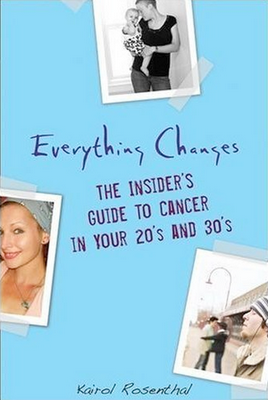Everything Changes: The Insider's Guide to Cancer in Your 20's and 30's

When I read the title of this book, it piqued my interest instantly. Let's face it: there is a lot out there about people over forty and their struggle with cancer, and even quite a bit about children with cancer. In fact, when I think of cancer, I usually picture someone the age of my parents and grandparents, or the boys and girls in ads for St. Jude's Children's Research Hospital. I don't picture myself or my fiancé, sisters, or friends. So I cracked this book open not really knowing what to expect. I quickly learned that 70,000 people in their twenties and thirties are diagnosed with cancer each year in the United States. Because they are not the face of cancer, they deal with a unique set of problems and often feel quite alone. Kairol Rosenthal, herself a cancer patient, wants to change that.
Rosenthal set out to write a book filled with the authentic experiences of real people. She wanted to tell their stories in their words and show that just as not every case of cancer is the same, not every cancer patient is the same. These young people are as diverse as any of us. Some reject the label "survivor," while others embrace it. Some find comfort in their loved ones like never before, while others feel it is too much to put on a happy face so they handle it alone. The book would have been poignant enough if she had merely put these stories on paper, but she didn't leave it at that. She also wanted to help cancer patients, along with their friends and families by providing resources, often free or inexpensive, that cover almost everything you can think of: health insurance, being a student, getting divorced, clinical trials, and much more.
Each chapter tells the story of one cancer patient, interwoven with some of Rosenthal's own experiences, and pull quotes from other patients about how they dealt with the issues brought up in that chapter. She ends each chapter by listing resources connected directly to the challenges the patient in that chapter deals with. For example, the chapter about Wafa'a, a single twenty-something who feels her body is worthless, ends with a section about dating, sex, body image, and relationships. She shares when and how to reveal you have cancer while dating, booklets that teach you how to achieve orgasm and avoid pain, and websites that help you shop for make-up, wigs, and comfortable clothing.
The format of the book helps drive home not only the feelings and beliefs of the people Rosenthal interviewed, but also practical things that can be done to deal with these struggles. I liked that she left their experiences in their own words, because it made me feel like I was there in the room with them. I felt the narration she sprinkled in was eloquent and helped tie themes together. These themes were sometimes specific to cancer, but most often about life, healing, race, gender, age, relationships, and other things that come up in everyone's lives but pose a different challenge for young people living with cancer. I appreciated most that by the end of the book, I felt very empowered, and had learned a lot about these people's lives and what I might do if one of them was my friend.
The ultimate take-away: if you are a young person diagnosed with cancer, you are not at all alone; if you know somebody affected by cancer, treat them with the care, concern, respect and appreciation you always have, no more and no less. And, of course, read this book and share it with the people you love.